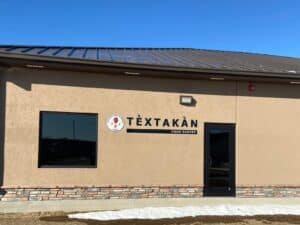
For reservations to experience “nkwiluntàmën: I long for it; I am lonesome for it (such as the sound of a drum)” by Indigenous artist Nathan Young, please go to https://nkwiluntamen.com/
Delaware Tribe of Indians Food Pantry Provides Needed Relief
- October 7, 2024
- Posted By: Pennsbury Manor
In 2020, the Delaware Tribe of Indians in Bartlesville, Oklahoma received an unprecedented windfall of $56 million from the COVID relief stimulus. Suddenly, the Tribal Council had a golden opportunity to use these funds to provide much-needed community services.
One of the main priorities of the Tribe was to address the food insecurity of its members. 1 in 4 Delaware families were experiencing hunger. Tribal members would secretly send modest gifts to families in need to help pay for groceries, so no one would have ever thought they were struggling. The Tribal Council realized that they needed to invest in combatting this acute issue.
In 2022, the Tribe opened the Food Pantry (Tèxtakàn), so community members could get the nu
According to Food Pantry Director Sonny Fixico, the creation of the Food Pantry reflects the Tribe’s priority of curbing hunger in the community long-term.
“I think it’s given people the help they need without just handing them ‘X’ dollars. I think this is more helpful longer term,” he says.
“By no means does it fix everything,” Fixico cautions. “But it definitely helps.”
The reaction from the people who use the Food Pantry has been overwhelmingly positive. Fixico says that the employees’ attitudes toward the people they serve as well as the layout of the pantry help to remove the stigma of getting assistance.
“We treat them as well as we can. We don’t make anybody feel down about coming in, so I think with that kind of attitude there’s not the embarrassment that people may feel about it. We run it more like a store.”
Each member gets a certain number of servings of protein, fruit, vegetables, and grain in proportion to the size of the household. However, the members can shop for whatever items they want from their allotment of servings. The Food Pantry provides fresh fruits and vegetables when possible. Those items in addition to meat are the most sought after.
As more people use the Food Pantry, the Tribe is looking for ways to increase supply.
Last year, the Food Pantry started partnering with the Food Bank of Eastern Oklahoma. This allows them to receive a greater variety of food for cheaper prices.
In the future, Fixico would like to see the food pantry become income based. Currently, any Delaware tribal member is eligible to come in, regardless of income. He would want to set the income limit above food stamps so they can provide nourishment to those who are not being served by food stamps.
Another aspiration for some Tribal members is to expand food sovereignty, or the concept that the Native community should be self-reliant on food.
“Nowadays nobody knows how to get anything. We just go to Walmart for everything,” Fixico explains. “To me food sovereignty would be planting our own food and keeping up with our own stuff, not just paying Walmart to do it all.”
The Tribe has already started an orchard to grow their own fruits. Another tribal member is growing a seed garden. There are plans to eventually start a livestock ranch to sustainably source meat.
Despite its challenges, Fixico says that the work of running the food pantry is rewarding.
“It’s kind of like pumping life into the tribe. You’re making sure everybody’s eating and getting their water. It’s great.”